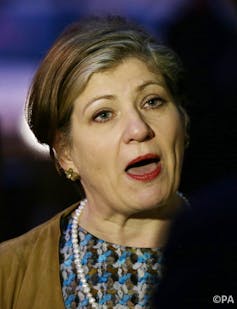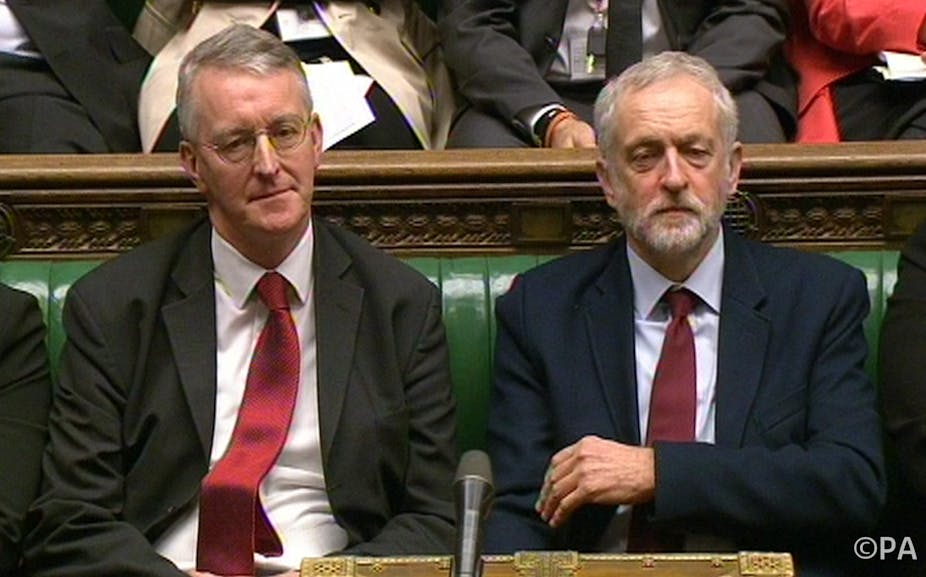After one of the most protracted reshuffles in recent years, the new shadow cabinet has finally been announced. Michael Dugher was first to be sacked from his position as shadow culture secretary and, more than 12 hours later, Europe spokesman Pat McFadden went the same way.
Emily Thornberry, who opposes the Trident nuclear deterrent alongside Corbyn, has been brought into the fold as the new shadow defence secretary, replacing the pro-Trident Maria Eagle, who has been demoted to shadow culture secretary.
Even after taking more than 30 hours to reach his decisions, Corbyn faced an immediate backlash. Kevan Jones, the shadow minister for the armed forces, has already resigned , citing his support for Trident.
Another two front benchers – Stephen Doughty and Jonathan Reynolds – have also quit in protest over McFadden’s sacking.
The key element of the reshuffle is not who has been sacked, though. It’s who hasn’t been. And the name on everyone’s lips is Hilary Benn.
Out of options
The tricky situation in which Corbyn found himself was somewhat inevitable. He is surrounded by a Parliamentary Labour Party that largely doesn’t support him or his policies, yet he received a massive mandate from those voting in the Labour Party leadership contest. Corbyn needs to create a strong, cohesive, loyal shadow cabinet to fight his corner and sell his policies to the party and the public at large.
However, this is directly at odds with his personal history. As a left-wing MP in a centrist party during the Blair and Brown years, Corbyn became a rebel, repeatedly voting against his party leader and the party’s accepted policies.
When he became leader, Corbyn said he wanted a new kind of politics. He wanted to be inclusive and allow members of his cabinet to express their opinions and discuss issues freely.
Unfortunately, the management of a major political party in the UK does not suit factionalism. Voters and supporters of any political party require unity of purpose and policy. Rebellion signals troublesome infighting and often leads to electoral disaster.
The recent debate on airstrikes in Syria brought this into sharp focus. Corbyn spoke passionately of his opposition to war but only a little later, Benn, shadow foreign secretary, stood up from the same bench to give the speech of his life in support of the attacks. The question for Corbyn was what to do about the obvious dissent in his ranks.
The answer was somewhat clearer in terms of Maria Eagle. Her support for Britain’s nuclear deterrent immediately put her at odds with Corbyn and his supporters. It was only a matter of time before that made her job untenable.
But her removal, while fairly straight forward in party management terms, has raised huge questions over the credibility of the front bench, particularly with reports of North Korea detonating a nuclear weapon overnight. The timing could not be worse for Corbyn and the suggestion from his shadow chancellor that opponents somehow temporarily move to the backbenches to express criticism of the leaders is, at best naive, and at worst, completely ludicrous.
That logic certainly hasn’t been applied to Benn. He has become such an important and influential figure within the Labour Party that Corbyn faced a difficult reality. Did he want a strong shadow cabinet colleague who would, on occasion, feel able to speak out against the views of his leader and perhaps the wider shadow cabinet or did he want such a big beast roaming the backbenches, taking potshots at the leadership at will?
Corbyn appears to have concluded that keeping Benn in post was the lesser of the two evils. Press reports overnight indicate that Benn’s survival may have been linked to a deal not to speak out against the leader, but this seems a little unlikely. Benn’s speech during the Syrian airstrikes debate was delivered knowing the views of his leader and the trouble which his dissent could bring. He did it anyway and his profile profited enormously. Why would he stifle his conscience and remove his own freedom of speech in order to become a puppet shadow foreign secretary now?

Corbyn has attempted to secure his position by strengthening his shadow cabinet and drawing in those who are ideologically similar to him. This may be problematic as it appears that the shadow cabinet is becoming increasingly separated from the wider Parliamentary Labour Party, which might lead to disaster in the future. Damage is already being done if opinion polls on the party and the leader are to be believed.
The rhetoric of a new type of politics seems to now only partially apply. Corbyn expects Labour MPs to do as he says, not as he has previously done.
Hilary Benn remains a key party figure, but how long can he continue when his views on foreign policy are so at odds with those of his leader? Surely that will depend on his support within the party. He could easily begin to fade and any loss of support would make him vulnerable. More likely, Benn will continue to be a thorn in Corbyn’s side, as his supporters, of whom there are many, wonder whether he wouldn’t make a better leader.

